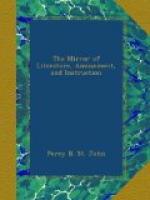In “Vino Veritas."—Horace with commendation of kings—
—who
never chose a friend
Till with full bowls they had unmasked
his soul,
And seen the bottom of his deepest thoughts.
But much dependence cannot be placed upon what is wrung out of a man under the influence of wine, which does not so much unveil as it disarranges our ideas; and, therefore, whoever contemplates the character from the combination of ideas produced by intoxication, views man in a false light. Violent anger has nearly the same effect as wine.
Cupid—was painted blind by the ancients, to signify that the affections prevent the sight, not so much from perceiving outward as inward defects.
Character.—Whoever would study the characters of those with whom he lives or converses, must keep up the appearance of a kind of recklessness and frivolity, for the mind closes itself up like the hedgehog, at the least sensible touch of observation, and will not be afterwards drawn out. Men have been known in the middle of a discovery of their character, to be stopped short by a look, which brought them to themselves, and traced before them in an instant the danger of their position and the methods of escape. A keen observer, indeed, may always adjust the temperature of his discourse by the faces of his auditors, which are saddened or brightened, like the face of the sea in April, as more or less of the sunshine of rhetoric breaks forth upon them.
Greatness.—What renders it difficult for ordinary minds to discover a great man before he has, like a tree, put forth his blossoms, is the manner, various and dissimilar, in which such persons evolve their powers. For as in nature the finest days are sometimes in the morning overclouded and dark, so the developement of genius follows no rule, but is hastened or retarded by position and circumstance. But to a keen eye there always appear, even in the first obscurity of extraordinary men, certain internal commotions and throes, denoting some magna vis animi at work within.
Physiognomy.—When Atticus advised Cicero to keep strict watch over his face, in his first interview with Caesar after the civil wars, he could not mean that he might thereby conceal his character from Caesar, who knew well enough what that was; but he meant, that by such precaution he might conceal from the tyrant his actual hatred and disgust for his person. Yet for the character and secret nature of a man, fronti nulli fides.
Writing.—It was Addison, we believe, who observed of the schoolmen, that they had not genius enough to write a small book, and therefore took refuge in folios of the largest magnitude. We are getting as fast as possible into the predicament of the schoolmen. No one knows when he has written enough; but, like a player at chess, still goes on with the self-same ideas, merely altering their position. This must




